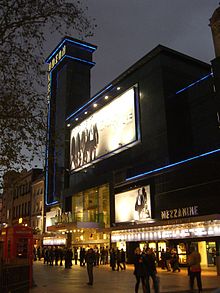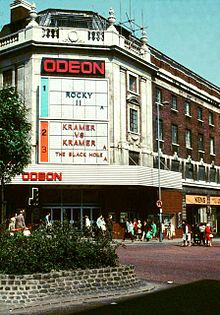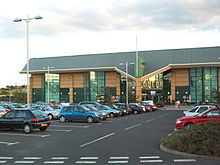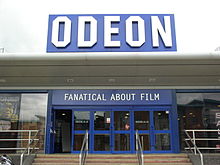- Odeon Cinemas
-
Odeon Cinemas Type Cinema chain Founded 1928 Owner(s) Odeon & UCI Cinemas Group Website www.odeon.co.uk Odeon Cinemas is a British chain of cinemas, one of the largest in Europe. It is owned by Odeon & UCI Cinemas Group whose ultimate parent is Terra Firma Capital Partners.
Contents
History
Odeon Cinemas was created in 1928 by Oscar Deutsch. Odeon publicists have claimed that the name of the cinemas was derived from his motto, "Oscar Deutsch Entertains Our Nation",[1] but it had been used for cinemas in France and Italy in the 1920s, and the name is ultimately derived from Ancient Greek[citation needed]. The name "Nickelodeon" was coined in 1905 and was widely used to describe small movie theatres in the United States during that era.
However the company is most associated with J. Arthur Rank, the owner for the longest period in its history.
The first cinema opened by Oscar Deutsch was located in Brierley Hill, West Midlands in 1928.[2] The building has long since been demolished, but as of 2006, the former UCI Cinema (built in the 1980s as an AMC multiplex) at the Merry Hill Shopping Centre in Brierley Hill was refurbished as an Odeon Cinema. The first cinema opened under the "Odeon" brand was located in Perry Barr, Birmingham.[3][4] It was designed by Harry Weedon. The frontage was remodelled following damage sustained in World War II and, having been a bingo hall, has since been converted into a conference venue.
By 1930, "Odeon" was a household name and the cinemas known for their maritime-inspired Art Deco architecture. This style was first used in 1930 on the cinema at Perry Barr in Birmingham, which was bought by Deutsch to expand the chain. He liked the style so much that he commissioned the architect, Harry Weedon, to design his future buildings.[5] George Coles was also one of their principal architects, remodelling a partially complete assembly hall in Portslade and designing his first purpose-built cinema in Upper Wickham Lane, Welling, Kent which opened on 22 October 1934 and closed on 22 October 1960. It is presently a bingo club in the Mecca chain. It featured central linear lighting, a feature that became characteristic of his work.
In 1935, Oscar Deutsch commissioned John Maltby (1910–80), a professional photographer, to photograph every cinema in the Odeon chain at that time. The resulting collection, of internal and external photographs, is held by the National Monuments Record, in the public archive of English Heritage and can be seen online.
Deutsch sold the chain to the business interests of J. Arthur Rank, who was in the process of forming the Rank Organisation.
In just 10 years between the first of the cinemas and Deutsch's death in 1941, 258 Odeons opened throughout Britain.[6] After the sale to J. Arthur Rank Corporation, Odeon also operated a wholly owned Canadian subsidiary, Odeon Theatres (Canada) Ltd., with more than a hundred cinemas in Canada, coast-to-coast. The head office of Odeon Canada was in Toronto, Ontario, and later, the north Toronto suburb of Willowdale, Ontario. This business was sold in 1978 to the Canadian Theatres chain and became Canadian Odeon Theatres, then was sold again in 1984 to Cineplex, forming Cineplex Odeon (now, once again, Cineplex).
Each Odeon cinema had a character different from most other cinemas in the UK, often having a unique and spectacular interior. They also ran their own advertising company, called Rank Screen Advertising, in competition with the UK market leader Pearl & Dean, which it eventually overtook.
A smaller number of Odeon cinemas opened in the post-war years (Odeon Marble Arch and Odeon Elephant & Castle being notable instances), but many single-screen cinemas either closed, sub-divided into smaller screens or were converted into other uses, such as bingo.
The flagship cinema, the Odeon Leicester Square, is one of the largest cinemas in Great Britain and host to most of London's West End film premières, retaining its large screen and circle & stalls layout.
Present day
Since the turn of the century, Odeon has undergone a series of sales, firstly to Cinven in 2000, which merged Odeon with Cinven's ABC Cinemas chain and then to a group of private investors in 2003. In 2004, the chain was purchased by Terra Firma and merged with United Cinemas International to produce the largest cinema chain in Europe.[7] As a condition of this merger (imposed by the Office of Fair Trading), Odeon Newcastle upon Tyne, Sutton Coldfield, Poole, Quinton, Hemel Hempstead and London Bromley have been sold to Empire Cinemas. Many smaller, older cinemas such as Odeon Grimsby on Freeman Street were closed down to keep market-share within legal limits. The remaining UCI cinemas, including thefilmworks brands, were rebranded as Odeon from 4 November 2005.
On 14 August 2006, Odeon announced that it will open its first cinema in Northern Ireland, in Belfast city centre, as part of Belfast's Victoria Square development.[8]
The Republic of Ireland cinemas of UCI have also become part of the Odeon chain, and while they will be retaining the UCI brand name, some evidence of the merger has appeared in Ireland, for example when booking tickets by credit card, the name "Odeon" appears, as well as some dual branded campaigns. The Odeon in-house film review magazine, "Onscreen", is now also distributed in UCI cinemas in Ireland, retaining the Odeon logo font throughout. In August 2007, UCI launched a new Irish website with an identical layout to odeon.co.uk. This website states that the Irish cinemas were sold to an Irish group, Entertainment Enterprises, in September 2006. This transaction went unreported in the Irish media. It also states that the cinemas remain part of the Odeon chain under a management contract. Rank/Odeon previously ran cinemas in Ireland (including the flagship, the Savoy Cinema in O'Connell Street) until 1982, when they were purchased by Ward Anderson. In April 2008, Entertainment Enterprises announced that it purchased the Republic of Ireland assets of Storm Cinemas (the entire chain with the exception of the Belfast cinema), and as with the existing UCI chain, would be contracting the running of the cinemas to Odeon.[9]
In Bradford there has been a concerted effort to save their Odeon, which closed in 2000. Bradford City Council have plans to demolish the art-deco building and replace it with a new complex of shops and offices. Campaigners have made seven separate attempts to have the building listed, all of which have been rejected. A poll cited on BBC Radio Leeds showed the majority of city residents wished to save the Odeon.
Odeon has now acquired at least 10 cinemas in Italy, making Odeon officially the largest cinema chain in Europe and third in the world.
Many of the Cinemas have a Costa Coffee coffee shop, a Ben & Jerry's ice cream kiosk, a bar area and an IMAX auditorium.
Controversy - Website Accessibility
For an extended period the Odeon cinema listings website was accessible only to Microsoft license-holders running certain versions of Internet Explorer, a design decision which frustrated many, and allegedly contravened the Disability Discrimination Act.
Technologist Matthew Somerville attempted to draw the public's attention to Odeon's dismissal of his concerns, and prove that there were no technical obstacles to providing a more usable alternative design. His 'Accessible Odeon' harvested information from the company's website and redelivered it using established web standards, also making it possible for non-Microsoft browsers to submit online bookings. His site received wide coverage and acclaim in UK newspapers and across the web.
Odeon initially took a public stance which accepted his contribution, and promised not to seek closure of the site. However, In June 2004, Odeon demanded that Somerville remove the facility provided to users of non Microsoft software to book films online, threatening copyright and trade mark infringement and suggesting that criminal proceedings could be brought under the Data Protection Act. Finally they insisted that unless the site be removed altogether, legal action would be taken. Somerville complied and shut down the site.
Controversy - Refusals to Screen Certain Films
In 2008, Odeon made a controversial move by refusing to screen Rambo (film) on any of its UK screens, blaming it on "commercial differences". In 2010 Odeon and a couple of other multiplex cinema chains attempted to boycott Tim Burton's Alice in Wonderland (2010 film), but after negotiations with Disney, Odeon and the other cinema chains backed down.
See also
- Odeon Newport, South Wales now the Newport City Live Arena
- Odeon Cinema, Weston-super-Mare
- Hammersmith Odeon, now the Hammersmith Apollo
- Major West End cinemas
UK Venues
- Andover (formerly Reel Cinema)
- Aylesbury
- Ayr
- Banbury
- Barnet
- Basingstoke
- Bath
- Beckenham
- Belfast
- Birmingham
- Blackpool
- Bournemouth (ABC)
- Bournemouth (ODEON)
- Bracknell
- Braehead
- Bridgend
- Brighton
- Bristol
- Bromborough
- Camden
- Canterbury
- Cardiff
- Chatham
- Chelmsford
- Colchester
- Corby (Opening 2012)
- Covent Garden
- Coventry
- Crewe (formerly Reel Cinema)
- Darlington
- Derby
- Dorchester[disambiguation needed
 ] (Opening 2012)
] (Opening 2012) - Dudley (Merry Hill)
- Dumfries
- Dundee
- Dunfermline
- East Kilbride
- Edinburgh Lothian Road
- Edinburgh Wester Hailes
- Epsom
- Esher
- Exeter
- Gerrards Cross
- Glasgow Quay
- Greenwich
- Guildford
- Harrogate
- Hastings
- Hatfield[disambiguation needed
 ]
] - Hereford
- Hereford Old Livestock Market (Opening 2013)
- Holloway
- Huddersfield
- Hull
- Kensington
- Kettering
- Kilmarnock
- Kingston[disambiguation needed
 ]
] - Lee Valley
- Leeds-Bradford
- Leicester
- Lincoln
- Liverpool Central Village (Opening 2013)
- Liverpool ONE
- Liverpool Switch Island
- London - Leicester Square
- London - West End
- Loughborough (formerly Reel Cinema)
- Maidenhead
- Maidstone
- Manchester
- Mansfield
- Marble Arch
- Metrocentre
- Milton Keynes
- Muswell Hill
- Newark (formerly Reel Cinema)
- Norwich
- Nuneaton
- Oxford George St.
- Oxford Magdalen St.
- Panton St.
- Port Solent
- Preston
- Putney
- Richmond
- Rochdale
- Salisbury
- Sheffield
- Silverlink
- South Woodford
- Southampton
- Southend
- Stoke
- Streatham
- Surrey Quays
- Swadlincote
- Swansea
- Swiss Cottage
- Tamworth
- Taunton
- Telford
- Telford Shopping Centre (Announced)
- Tottenham Court Rd.
- Trafford Centre
- Trowbridge (Opening 2013)
- Tunbridge Wells
- Uxbridge
- Warrington
- West Thurrock
- Weston super Mare
- Whiteleys
- Wimbledon
- Worcester
- Wrexham Eagles Meadow
References
- ^ "From bargain-bin store to bingo hall, the sad fate of the Odeon popcorn palaces". The Daily Mail. 12 May 2009. http://www.dailymail.co.uk/news/article-1180949/From-bargain-bin-store-bingo-hall-sad-fate-Odeon-popcorn-palaces.html. Retrieved 16 May 2009.
- ^ The Coming of the 'Talkies' and the 'Super' Cinemas
- ^ Gorst, Thom (1995) The Buildings Around Us. Taylor & Francis ISBN 0419193308
- ^ Digital Handsworth: Timeline of the 20th century
- ^ Cinema History For Sale At First Odeon[dead link] - The Independent( Republished by Find Articles), August 11, 1998. Retrieved: May 18, 2007
- ^ How Oscar Deutsch's Odeon cinemas taught Britain to love modern architecture - The Guardian, May 18, 2002
- ^ Odeon: About Us
- ^ Cinema giant to open high-tech complex[dead link] - Investment Belfast News
- ^ [1][dead link]
- Eyles, Allen (2002) Odeon Cinemas; Vol. 1: "Oscar Deutsch Entertains Our Nation". London : Cinema Theatre Association ISBN 0851708137
- Eyles, Allen (2005) Odeon Cinemas; Vol. 2: From J. Arthur Rank to the Multiplex. London : Cinema Theatre Association ISBN 1844570487
External links
- Official website
- Odeon & UCI Cinemas Group
- Map of Odeon Cinemas in the UK
- A mirror of Odeon's old official website
- International cinema conservation archive
- Birmingham's Industrial History Website
Major cinema chains in the United Kingdom AMC - Apollo - Cineworld - Empire - Odeon - Picturehouse - Scott - Showcase - Vue - Ward Anderson - EverymanCategories:- Companies established in 1928
- Cinema chains in the United Kingdom
- Private equity portfolio companies
Wikimedia Foundation. 2010.





